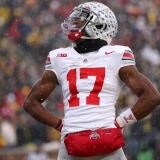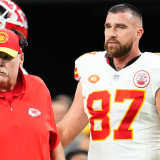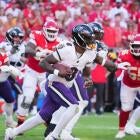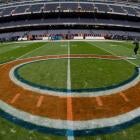Super Bowl 50 Key Matchup: Can the Broncos get their run game going?
In order to take pressure off Peyton Manning, Denver's defense and running game must perform well. Carolina sports one of the NFL's best run defenses. Which team will come out on top when Denver runs the ball?

Note: This is one of our two Super Bowl 50 Key Matchups posts. Each post will focus on the most important factor when one of the two Super Bowl teams has the ball. The second post, on whether the Panthers offensive line can keep pressure away from Cam Newton, will run on Friday.
Throughout the 2015 season, the Denver Broncos got mostly below-average play from their quarterback, Peyton Manning. He finished the regular season with a 59.8 completion percentage, 6.8 yards per attempt, 9 touchdowns and 17 interceptions. Even during Denver's two playoff games -- Manning's only two starts of the year in which he was not picked off -- he didn't exactly shine. Manning completed only 38 of 69 passes for 398 yards against the Steelers and Patriots. That's an average of 5.8 per attempt, even worse than his regular-season figure.
Peyton's a living legend so expecting a disastrous performance in the Super Bowl is probably going too far, but we also probably shouldn't expect him to suddenly put on a prolific display that reminds us of the Manning of old, either. A slightly below average performance -- which would be pretty much exactly how he has played these past few weeks, regardless of how much credit he's received for merely not playing as poorly as he did earlier this year -- is probably what we're going to get.
The best way to cover up for below average quarterback play, now as ever, is to play great defense and run the ball well in order to control the clock. The Broncos, if they play their best, have the first part of that equation down pat. Denver's defense finished the season ranked No. 4 in the league in points allowed, No. 4 in yards allowed, and No. 1 in Football Outsiders' defensive DVOA (Defense-adjusted Value Over Average, which adjusts performance for down, distance, and opponent).
They allowed a score on the second-lowest percentage of opponent drives in the league (Carolina was first). The Panthers offense led the NFL in points per game this season, but the Broncos have held down strong offenses all year long, including in the playoffs -- their two opponents in their run to the Super Bowl ranked Nos. 3 and 4 in the NFL in scoring offense this season.

The strength of Denver's running game is less certain. It has been an up-and-down season for both C.J. Anderson and Ronnie Hillman, who have each enjoyed stretches of the season as the (relatively) unquestioned lead ball-carrier and more recently have been splitting carries essentially down the middle. Anderson began the year as the starter but performed so poorly (67 carries for 180 yards, or 2.69 per carry, through Week 6) through the early part of the season that Gary Kubiak had no choice but to turn to Hillman. Hillman got all the starts from Week 8 on, but he stumbled badly in Weeks 12 to 16 (68 carries for 218 yards, or 3.21 per carry).
Over Denver's past three games, they've essentially split carries down the middle, with Anderson handling 46 totes and Hillman taking 42.
In their two playoff games, the Broncos have run for 208 total yards. Anderson has hit 72 in each game (on 15 and then 16 carries), while Hillman has been less effective (54 yards on 27 carries). An average of 104.0 rushing yards per game is essentially the equivalent of the 20th-ranked rush offense in the league, and if the Broncos want to keep the pressure off Manning in Super Bowl 50, they'll have to do better than that. Let's examine the areas where it might be possible for them to do that.
The matchup: Broncos' running backs vs. Panthers' defense
Take a look at the chart below, which shows (via tracking from Pro Football Focus) the attempts, yards, per-carry average, and number of touchdowns the Broncos ran for, and the Panthers allowed, in each of the different running lanes.

For each team, we've highlighted lanes that yielded relatively high (green) or low (red) yards-per-carry averages throughout the season thus far to give you a better idea of where the Broncos might be able to make some hay in the running game and when they might be expected to struggle. (We did the same thing when examining the Seahawks' running game before Super Bowl XLIX.)
Luck to the Broncos' left
The most obvious area of potential advantage for Denver is wide to the left side of the field. That's the only green-on-green lane in the chart above, indicating that Denver runs for a high number of yards per carry in that lane and that the Panthers allow a high average there, as well.
Given that Jared Allen (Carolina's right defensive end) suffered a broken foot in the Panthers' opening game of the playoffs a few weeks ago, he seems likely to be limited for the Super Bowl, even though he does expect to be on the field. When Allen comes out of the game, Kony Ealy and Mario Addison take the snaps on the right side (Ealy is mostly a pass-rush specialist, though). Because of Allen's injury, we can probably expect those two to see a few more snaps than they did when Allen was fully healthy. They'll all match up with the combination of left tackle Ryan Harris and tight ends Owen Daniels, Virgil Green, and Vernon Davis.
Though Denver had success running outside him this season, Harris did not exactly have a great year blocking in the run game, while Daniels is probably the weakest of the three run blockers and also currently the one getting the most playing time. So it could be a bit tougher running wide left than it might initially appear.
Tough running up the middle
If Denver tries to run up the middle, they could find similarly tough sledding. Star Lotulelei and Kawann Short form one of the best defensive tackle combinations in the NFL and together with Dwan Edwards and Kyle Love, they made it nearly impossible for opposing running backs to find space through the middle of the line. Short, in particular, is an absolute handful. He had one of the most dominant interior defensive line campaigns of anyone in the league this year, right up there with anyone outside J.J. Watt and Aaron Donald.

The interior of Denver's offensive line -- center Matt Paradis and guards Evan Mathis, Louis Vasquez, and Max Garcia -- was likely its weakest component this season, and matching up with the Carolina defense's greatest strength (it's not just the defensive tackles but also middle linebacker Luke Kuechly that they'll have to deal with) probably does not bode well for them in this game.
You can try to double-team Short with Paradis and one of the guards, but it's not as if plenty of teams haven't already tried that. Not only is he able to slice through doubles with his quickness off the snap, but it leaves single coverage on whichever of Lotulelei, Love, or Edwards is next to him, and it takes an extra beat longer for whichever of the two doublers is responsible for blocking Kuechly to make it to the second level.
An extra beat is usually far more than Kuechly needs to make a play. Mathis is the team's best run blocker and probably the only one potentially capable of blocking Short one-on-one, but the Panthers can easily just slot him over to the other side of the line to keep him away.
Don't run right
Running right also presents problems for the Broncos, given that Michael Schofield is not a strong run-blocker and the two guards that play mostly on the right side (Vasquez and Garcia) aren't as good in the running game as Mathis. Running right also means running at Charles Johnson, who is Carolina's best defender in the running game among their defensive ends.
If it seems like there's really no good place for Denver to run, that's because it's true. The Panthers finished the season having allowed the fourth-fewest rushing yards in the NFL. They yielded the seventh-lowest yards per carry average and the fourth-lowest Adjusted Line Yards (via Football Outsiders, ALY assigns credit to the line as a percentage of yards gained), while they finished with the No. 6 rushing defense DVOA.
The Panthers didn't arrive in the Super Bowl by accident. They dominated the field in the air and on the ground, offensively and defensively. The Cam Newton-led offense gets most of the attention, and what little media coverage doesn't go to him, usually goes to Carolina's pass defense. Josh Norman is a star. The rest of "Thieves Ave" help him force a ton of turnovers and Luke Kuechly and Thomas Davis might just be the two best coverage linebackers in the NFL.
The Panthers will need their pass D to show up against Peyton Manning, but in order to put the greatest amount of pressure on him possible, they'll also have to keep the Denver running game from breaking out.

















